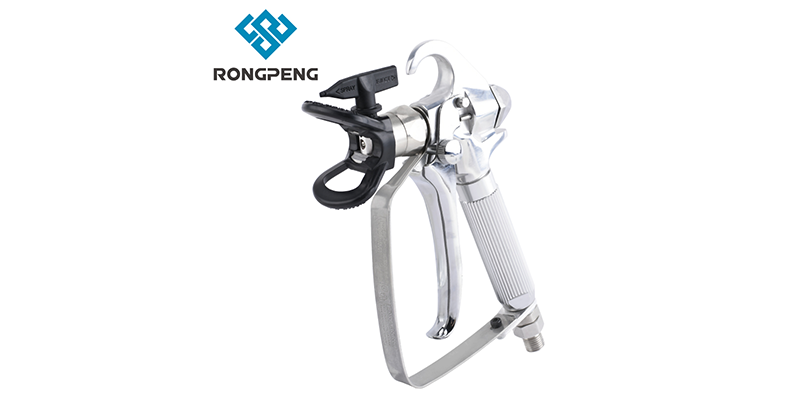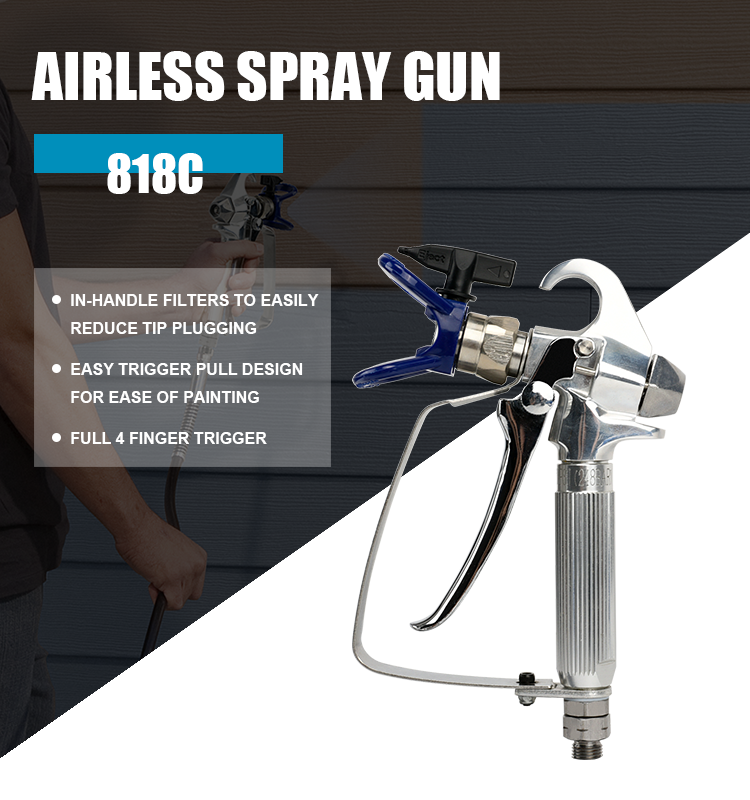

Airless paint spray guns have become popular among both professional painters and DIYers due to their ability to spray thicker coatings faster than conventional spray guns. If you’re considering using an airless spray gun for your next paint job, you probably have some questions. We'll answer some common questions people have about airless paint sprayers. What Is an Airless Paint Spray Gun? Airless spray guns work by pumping paint from a reservoir through a hose and nozzle at extremely high pressure, ranging from 1500 to 3000 PSI. This high hydraulic pressure atomizes the paint into tiny droplets as it exits the nozzle, allowing it to fan out and coat surfaces evenly. The spray guns use an electric or gas powered pump to generate this pressure, there are no air compressors or turbines involved. The pump generates enough force to both atomize the paint and propel it directly onto surfaces without needing compressed air. This is what makes these sprayers "airless." Advantages of Airless Spray Guns Fast application. High pressure allows airless sprayers to deliver up to 2 gallon of paint per minute, allowing the user to coat surfaces rapidly. Professionals can quickly cover large areas using these tools. Thick coatings. The high pressure atomization allows airless sprayers to easily apply unthinned paints and thicker coatings not possible with other spray methods. This makes them well suited for applying primers, enamels, latex, etc. Reach. Airless tips allow painters to spray up to around 12 feet vertically and horizontally, allowing coverage of high walls, ceilings, and distant surfaces. Portability. Airless sprayers are available in compact sizes, and don't require bulky air compressors like conventional spray systems. This makes them easy to move between jobsites. Differences From Conventional Spray Guns While airless and conventional spray guns both atomize paint and propel it onto surfaces, there are some key differences users should be aware of. Airless spray relies solely on hydraulic pressure to atomize the paint, while conventional guns use compressed air and siphon effect. Airless tips generally produce a thicker, more textured pattern than conventional spray guns. The atomization isn't as fine. Overspray is lower with airless, but the spray pattern can't be adjusted as easily as with conventional guns. Airless spray requires very high pressure hoses and components that can withstand the intense hydraulic forces. Conventional spray guns operate at lower pressures. Conventional HVLP spray guns are generally better suited for fine finishing work and spraying thin coatings due to their superior atomization. Do Airless Spray Guns Use More Paint? A common misconception is that airless sprayers use more paint compared to applying paint with a brush or roller. However, because airless guns significantly reduce overspray, the actual difference in paint consumption is relatively small. For large jobs, an airless gun actually uses less paint than manual methods since the increased coverage speed reduces the number of dips into the paint reservoir. Less paint is loaded onto the surface only to be spread around. Airless tips do allow for heavier film builds per coat. But users should adjust the speed and tip size so that the appropriate amount of paint is applied. Used properly, over-application should not be an issue. When Should I Use an Airless Sprayer? Airless sprayers excel at applying coatings to large surface areas quickly and efficiently. The high productivity of airless makes them ideal for exterior house painting, staining fences, painting commercial spaces, and other big projects. They also allow users to apply specialized industrial coatings like block fillers, primers, enamel, acrylics, and lacquers that can be difficult to brush on. Airless sprayers are great for covering uneven surfaces as well. For painting tasks involving smaller surface areas, lots of cut-ins, or fine finishing work, conventional spray gun and rollers may be preferred. Consider the size of the project and type of paint when determining whether airless spray is the most suitable application method. 270° rotation tip guard. Stainless Steel housing with Plastic guard. Full 4 finger trigger for less operator fatigue. In-handle filters to easily reduce tip plugging. Well balanced and lightweight to reduce operator fatigue. Easy trigger pull design for ease of painting and less operator fatigue. Special spray gun for airlesss paint sprayer and latex paint. Inlet Fitting 1/4 luch Thread, Swivel joint. Can be used on most of airless paint sprayers. Model:818c Pattern Width:254-305mm Type of feed:Pressure Operating Pressure:3600PSI Paint inlet connection:1/4-18-NPSM Standard Nozzle Size:517 RONGPENG has quickly risen to become an unrivaled global producer of air-powered devices including air tools, air spray gun, air nailer, airless paint sprayer, and etc. RONGPENG seeks independent sales agent to represent and market our industry-leading pneumatic tools. We support OEM, ODM, OBM customization, small order quantity is acceptable and samples are available. Make any cooperation possible. Any services related to the product, inquire with us now! Rongpeng@Rongpeng.Com  For painters looking to get jobs done faster, the RONGPENG 818C airless spray gun delivers the high-quality performance you need.
For painters looking to get jobs done faster, the RONGPENG 818C airless spray gun delivers the high-quality performance you need.